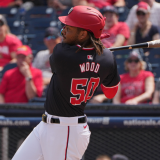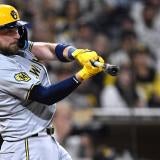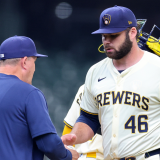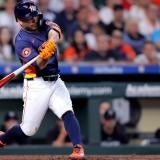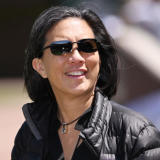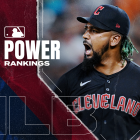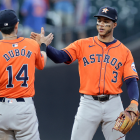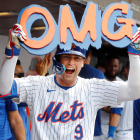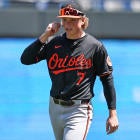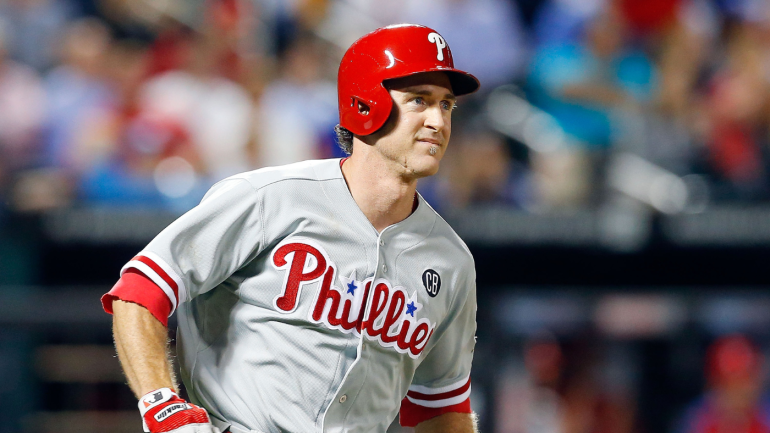
During the course of my annual looks at the Hall of Fame ballot (so far I've done 10 storylines, Adrián Beltré and Joe Mauer, for those interested), I'll get a decent number of questions that seem basic to hardcore Hall of Fame fans while not being something that's on the radar of the casual sports fan. A good example of this is: What is a peak candidate?
Chase Utley is a good example of a peak candidate.
At first glance, his career numbers paint the picture of a very good player who isn't quite up the standard of a Hall of Famer, especially if we're talking about traditional numbers.
Utley was a career .275 hitter with 1,885 hits, 411 doubles, 58 triples, 259 home runs, 1,025 RBI and 1,103 runs scored. He was a good baserunner and swiped 154 bags in his career. He led the league in hit by pitch three times and runs scored once, but that was it for his black ink. He was a six-time All-Star who won four Silver Sluggers. He won a World Series ring and appeared in the Fall Classic three times. He finished in the top 10 of MVP voting three times, but topped out at seventh.
That's a really good player and my hunch is this sort of resume in a 1960s/1970s vacuum doesn't sniff Hall of Fame consideration.
Utley was, though, a late bloomer with an extremely high ceiling who packed a major punch in his prime. Due to not being a full-time player until his age-26 season, a few injuries and being mostly a part-time player late in his career, Utley was not, at all, a compiler. It should be pointed out, also, that since it isn't the 1970s anymore, on-base percentage and slugging percentage are known to be more valuable than batting average and Utley had a .358 OBP along with .465 slugging, good for 117 OPS+ in his career. Still, this isn't moving the needle enough without accounting for the peak performance.
Was his peak high enough to overcome his lack of benchmark counting stats, such as 2,000 hits, 500 doubles or even 300 home runs? Let's paint that picture.
Utley's upper-tier peak was five seasons. He had several other productive seasons, but I'm going to work with five years where he was a Hall of Fame-level performer. Those years were 2005-09.
Here was his average season for five glorious years: 151 games, .301/.388/.535, .922 OPS, 135 OPS+, 175 hits, 39 doubles, five triples, 29 home runs, 101 RBI, 111 runs, 15 stolen bases.
He topped 30 homers three times, 100 RBI four times and 100 runs four times. He also averaged 7.9 WAR per season.
Let's latch onto the latter figure there. A general guideline of Baseball-Reference's WAR says that an everyday starter is around 2.0 WAR, an All Star-caliber player is around 5.0 and an MVP is around 8.0, though we've seen that dip down to 7.5 at times. Mookie Betts and Ronald Acuña, Jr. barely topped 8.0 this past season, just to make a comfortable comparison. If a player performs like Acuña did last season for five straight years and he did so while being an everyday second baseman, doesn't that sound absurdly good?
The part about Utley playing second base shouldn't be dismissed, either. He was a high-level defender (he led the majors in defensive WAR in 2008, for example) at an up-the-middle position while providing gaudy power numbers like we were accustomed to seeing from the corners.
Further, the average season here wasn't skewed by one or two massive campaigns. No, Utley was consistently elite. Here's the breakdown of WAR by season:
- 2005: 7.3
- 2006: 7.3
- 2007: 7.8
- 2008: 9.0
- 2009: 8.2
The five seasons with at least 7.0 WAR puts Utley in inner-circle, Hall of Fame company. Here are the second basemen to have five seasons with at least seven WAR:
- Rogers Hornsby, eight times
- Eddie Collins, eight times
- Nap Lajoie, seven times
- Utley, Joe Morgan and Charlie Gehringer, five times apiece
Ryne Sandberg and Jackie Robinson each did it four times. Four players did it three times, eight players did it twice and 15 did it once. That's it. Here's the full list for those interested.
Take note that the only players post-integration to get to the seven-WAR mark five times are Utley and Joe Morgan, who you could argue was the greatest second baseman of all-time (only Morgan and Hornsby won two MVPs at second).
Is all of this enough? Five great seasons? Even if they were five all-time great seasons for his position, it was only five.
As noted earlier, Utley had other good years. Injuries impacted his next five seasons, but he still hit .270/.355/.435 (116 OPS+) while averaging 4.0 WAR per season. That's a very solid second-level block when we're talking increments of five seasons. Most players aren't that productive in their five best seasons and those were Utley's sixth-10th best.
There are plenty of precedents on peak candidates. The gold standard is Sandy Koufax. Through the first seven years of his career, he was a one-time All-Star with a 3.94 ERA (105 ERA+). Then he was the best pitcher in the world for five years and that was the end of his career. He won "only" 165 games and finished with 2,396 strikeouts. Of course, he also has three Cy Youngs and an MVP in addition to a 0.95 ERA in 57 World Series innings, so we can throw him out on Utley comparisons.
Closer to home here, is there a peak Hall of Famer at second? Maybe Sandberg? He won MVP with his 8.6-WAR season, posted three others of at least 7.0, had a 6.1 and 5.9, but also mixed in seven full seasons with less than 4.0 WAR. He has 3.4 more career WAR than Utley, but Utley's WAR7 (top seven WAR seasons) is higher by 2.2. Sandberg had more runs, homers, RBI and 501 more hits. Generally speaking, he was a bigger star, I think (that's always tough to measure), but they're not that far off. It's close enough to think about where the "in" or "out" line is and if it's really right behind Sandberg, where Utley is standing.
Looping in everyone, Utley ranks 15th all-time in WAR among second baseman and is below the average current Hall of Fame second baseman. In the JAWS system, which should help Utley due to including peak performance, he's 12th all-time and nearly exactly the average Hall of Famer. Sandberg is 11th and just above the average. Roberto Alomar and Craig Biggio are just below Utley (as is Lou Whitaker and a decent-size following of people believe he should be in). Other Hall of Famers below Utley include Joe Gordon, Bobby Doerr, Nellie Fox, Tony Lazzeri and Johnny Evers.
There's always a balance to be struck in these matters and it's always subjective.
There are the career counting stats. Utley's don't exactly jump off the page, though among second basemen he's 17th in doubles, seventh in home runs and 17th in RBI.
There's the "feel" factor: When you were watching him play, did you think you were watching a Hall of Famer? There were a lot of times on Utley I really did. I'm sure many would argue that feeling didn't last long enough.
And, of course, there's how to weigh the peak, which in Utley's case is a major factor, even if not Koufax levels but close to Sandberg levels.
Sometimes when I go to work through these cases, I know where I'm going to land before I even start. I mean, c'mon, I knew Adrián Beltré was an obvious yes and while I'm going to go in with an open mind, I'll be shocked if I somehow end up on a yes for David Wright. On Utley, I wasn't sure but I thought maybe I'd land on no.
In working through it, I'm more leaning toward yes now. Remember, though, there are a maximum of 10 spots on the ballot. I'll get to my obvious yes players first before considering Utley and it's possible he's squeezed out. I do believe he has a strong case for consideration, however, on a peak basis.



